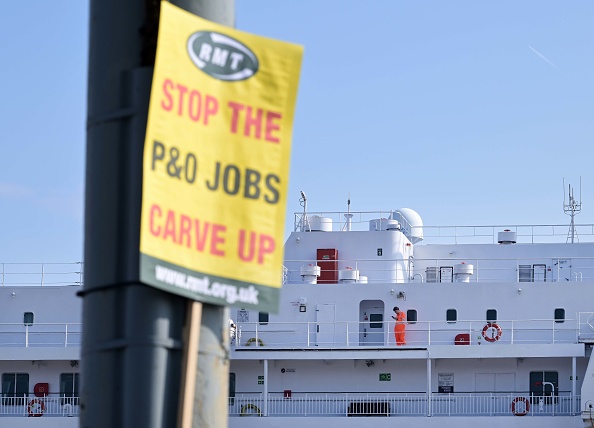Once-fearsome Unions have let P&O off lightly as their political capital unravels

A penny for the thoughts of Sir John Prescott as P&O Ferries plants itself at the top of the tree of corporate bad guys with its sacking of 800 British crew members.
The Labour heavyweight and former Hull East MP started out, let’s remember, as a steward on the Cunard line at the age of 17, serving up drinks to the passengers.
Tory grandee Nicholas Soames regularly played on this in the Commons and took to shouting across the floor: “A whisky and soda for me, Giovanni. And a gin and tonic for my friend!”
There’s no bubbly being popped in Hull today, as UK seafarers weigh up a summer on the bread line while P&O Ferries tries to paper over the cracks caused by its seismic restructuring.
Times have obviously changed since the Sixties, when Sir John was part of a crippling seafarers’ strike in 1966 that forced Harold Wilson’s government to declare a State of Emergency to clear ports and cargoes and use the Army to do dock work.
But what’s notable in the P&O tale is the relatively lightweight trade union reaction on the ground to sackings that rivalled the spring statement for media coverage.
Yes, this weekend saw talk of port blockades. But you’d have expected more from the RMT, a union once so feared by UK PLC.
On the day of P&O Ferries’ announcement, incensed union insiders likened the mass sacking to Rupert Murdoch’s infamous changing of the guard at Wapping. Yet if anything, it’s a Tory government leading the charge against the company.
People in the Labour movement whisper that we could be on the brink of a historic turning of the page. A defining moment where unions face up to the passage of time – and admit they have lost the sheer muscle and the influence they once had.
They point to Unite’s extraordinary bin men battle with Coventry City Council – a Labour run council. Unite’s Sharon Graham – famed for the ‘leverage’ squad that thinks nothing of picketing directors’ homes – has been at war with Coventry. In a remarkable escalation this weekend, Unite suspended all Labour’s councillors in Coventry from its membership. This from a general secretary elected on a mandate of keeping out of politics.
Despite all this, Coventry has yet to cave. In fact, it’s digging in.
It’s clear that government changes to trade union rules – members now have to actively ‘opt-in’ to a union’s political fund – have hit war chests hard. So has the shift to more of a service industry.
And official stats mirror the anecdotal evidence that industrial unrest is on the decline. In 2018, 67 stoppages began in the year, compared with 151 in 2014. Some 39,000 workers were involved in action in 2018, down from 511,000 in 2008.
But they’re far from dead. For instance, the GMB, which was founded in coal-fuelled gasworks, now has a thriving membership at Uber. And it’s too soon for big business to ignore the threat from outside. True, there appears to be a disconnect these days between people talking ‘protest’ and those following through on it.
It was notable in last week’s brutal Select Committee hearing that P&O Ferries chief executive Peter Hebblethwaite said that bookings were holding up on the company’s routes from Hull and Cairnryan.
But if anything, companies can still be far too ponderous and they need to devote more time drawing up a strategy for dealing with stakeholders of all kinds in a world dominated by social media. Gen Z is about to come of age – and understanding the first generation brought up on the internet and all-manner of screens will be completely different to what’s gone before. Speed and agility will be key.
And then there’s the future relationship with unions.
Union insiders themselves admit to the need for a more mature relationship with boardrooms. A more harmonious relationship, for instance, would allow them to recruit more members.
But companies may actually find it in their interest to offer the odd olive branch to those with unions with level heads too. There could be benefits in terms of unlocking productivity gains.
Take a look at Germany, which has morphed from the sick man of Europe following the reintegration of East Germany to an economic powerhouse. You could call it the most successful example of levelling up we’ve seen.
Wonks would tell you this is in part thanks to decentralized wage bargaining where pay, hours and working conditions are set by work councils and employers’ associations.
Something to ponder.